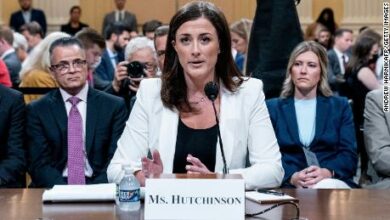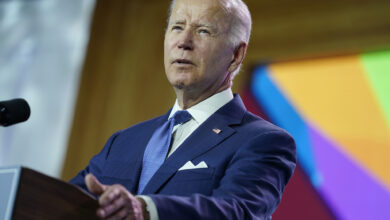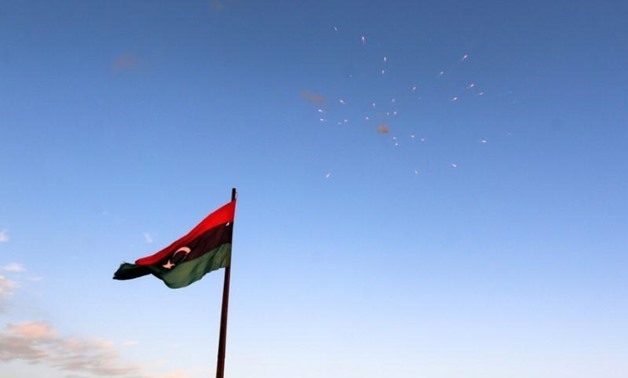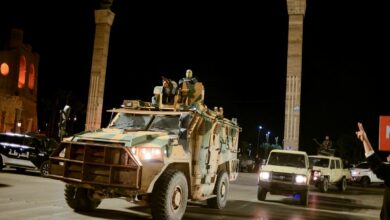After days of heated deliberations in political and religious circles, the architects of Egypt’s next constitution reached an agreement on Tuesday on the phrasing of the document’s most contentious article — the one that defines the role of Islamic law in the political order.
The Constituent Assembly’s subsidiary committee, tasked with drafting the first chapter of the constitution, agreed unanimously to adopt the phrasing of the previous constitution, which states that “the principles of Islamic Sharia are the primary source of legislation.”
This resolution came after Salafis in the assembly attempted to modify the clause and remove the term “principles” on the grounds that it excludes many Islamic commandments.
Despite their failure to introduce that modification, Salafis see a victory in adding a clause granting Al-Azhar, rather than the Supreme Constitutional Court, the right to decide what falls within the parameters of Sharia's principles.
Younis Makhyoun, a leader of the Salafi-oriented Nour party, says his group suggested this clause as a midway compromise to please all parties. “We found that this could be the solution. Even if it does not fully satisfy us, at least it can achieve some of what we want,” Makhyoun said on Tuesday.
This Salafi addition could be seen as an attempt to overturn the canonized interpretation of “principles of Islamic Sharia” handed down by the SCC in 1996.
“The court interpreted ‘principles of Sharia’ as the incontestable and well-evidenced commandments of Islam,” said Makhyoun. “According to this interpretation, a lot of Sharia commandments fall beyond the scope of [the constitution].”
Muslim Jurists divide Islamic commandments into two categories: the Ahkam Qat’eyya, which are incontestable and a matter of consensus among all established scholars, and Ahkam Dhaneyya, which bear different interpretations.
“All of the Qur’an is Ahkam Qat’eyya but most of the prophet’s Sunna is not,” he said. The term principles would lead to the exclusion of most of the prophet’s sayings and deeds, the Sunna, from the constitution, argued Makhyoun.
Long-term gains
In the short term, granting Al-Azhar the authority to rule over the boundaries of Sharia may not necessarily benefit Salafis. Although ultra-orthodox thought has already penetrated the world’s oldest Sunni institution in recent decades, Al-Azhar is currently controlled by Grand Sheikh Ahmed al-Tayyeb, a liberal, Western-educated grand imam known for his animosity to ultra-orthodoxy.
But Salafis are betting on changes within the institution in the future, after Tayyeb leaves the post.
“We are laying out a constitution for generations to come. We are speaking of Al-Azhar as an institution not as a person. Al-Azhar is not Tayyeb,” Makhyoun said.
Since Mubarak's ouster, Tayyeb had sought to preempt Islamists’ attempts to impose their relatively hardline interpretations of the role of religion in politics. Last year, he sponsored a ground-breaking document, dubbed the “Azhar Declaration,” which proclaims that the institution fully supports notions of democracy, freedom of religion and thought, and other liberal values.
At the same time, Tayyeb strove to consolidate his power and tighten his grip on the institution. He appointed a committee to draft a bill to ensure the independence of the institution from the state. A few days before the Islamist-dominated Parliament convened earlier this year, the Supreme Council of the Armed Forces unilaterally passed the bill, which was seen by many as an attempt to weaken the chances of a Salafi or a Muslim Brotherhood takeover of the influential institution.
The law, which gave Tayyeb the right to stay in office indefinitely, elicited a stir from his detractors within the institution and Islamists in Parliament.
“We will revise this law if we are back in Parliament. The law has several flaws,” said Makhyoun, a member of the contested Parliament. “It is illogical that the incumbent grand imam stays in office until his death.”
Fighting solo
The Salafi movement has had no allies in its fight to rephrase Article 2. The largest Islamist group in Parliament and on the Constituent Assembly, the more moderate Muslim Brotherhood’s Freedom and Justice Party, showed no interest in changing the old phrasing.
“We believe that the old article causes no problem. It is a balanced one and preserves the rights of all,” Sobhi Saleh, an FJP leader and a Constituent Assembly member, told Egypt Independent.
Salafis also sought to gain Al-Azhar’s support in the battle. Last week, Salafi leaders had met with the grand sheikh, hoping to convince him to endorse their views on Article 2. As expected, Tayyeb refused to toe the Salafi line.
“We expected Al-Azhar to take to the front lines on that and we would follow it,” Makhyoun said two days before the Constituent Assembly discussed the matter. “We expected Al-Azhar, the bearer of the flag of Islam, to demand [the implementation] of Sharia.”
While Salafis were fighting for what they call “a crucial matter,” Kamal Habib, an expert on Islamist groups, argued that the fuss about Article 2 was more political than ideological.
“[Salafis] are talking again about Sharia for electoral rather than genuine reasons,” argued Habib.
Salafis seek to persuade voters who backed them in the last parliamentary poll hoping they would implement Sharia that they did all they could to deliver their promise, added Habib, dismissing the Nour Party’s statements on Sharia as inconsistent.
“Before the last parliamentary elections, Salafis were addressing their constituencies saying that Sharia was their main concern,” said Habib. “After they won, Islamic Sharia was not part of their discourse as MPs. They began talking about real political issues. Then, they supported [liberal Islamist Abdel Moneim] Abouel Fotouh in the first round [of the president poll], despite the fact that Sharia was not part of his platform.”
Grassroots reaction
The Nour Party’s failure to introduce immediate and tangible changes to the role of Islam in politics raises questions about the future of a movement whose driving force to step out of proselytizing and into the political sphere was to Islamize the constitution and, with it, the state.
For decades, Salafis remained aloof from competitive politics and dismissed elections and democracy as forms of Western heresy. After Hosni Mubarak’s ouster last year, this attitude changed. Ultra-orthodox Islamists believed that their engagement in politics would contribute to adopting an Islamic constitution.
Several Salafi groups formed their own parties and engaged in parliamentary elections, including the Alexandria-based Salafi Dawah, the nation’s largest and most organized Salafi group. In only a few months, the nascent Dawah’s Nour Party won nearly one-fifth of parliamentary seats in last fall’s poll. A pledge to implement God’s law was the pillar of the party’s campaigning.
But Salafis say their loss in the fight over Article 2 won’t fundamentally change their political activities.
“Withdrawing from politics is not conceivable,” said Makhyoun. “If you cannot achieve your goal in full, you can achieve some of it, but you do not withdraw from the field.”
At the least, the Nour lawmakers can ensure that no legislation passed by Parliament violates divine laws, Makhyoun said.
The Salafi rank-and-file won’t hold the Nour leadership responsible for the failure to impose God’s law through the constitution, Nour Party members say.
Islam Abdel Bary, a 32-year-old member of the Nour Party and the Salafi Dawah, downplays the impact of yesterday’s resolution on the party’s members.
“The message reaching the base is that it is not [the leaders’] fault,” said the Alexandria-based mechanical engineer. “They insisted on the matter, but at a certain point they could not do more.”
Abdel Bary explained that the party’s grassroots are more concerned at the moment with the ongoing power struggle between the president and the SCAF and the future of the contested Constituent Assembly than Article 2.
“People like me, at the bottom of the party, have no confidence that this Constituent Assembly will remain,” he said.
The future of the Constituent Assembly hinges on a verdict that may be handed down by the Administrative Court next Tuesday. The court is examining appeals contesting the legality of the assembly on grounds that it fails to represent different segments of society and violates the interim constitution.
Earlier this month, the Salafi battle over Article 2 alarmed non-Islamists. The Coptic Church reacted with a statement last week declaring that it might reconsider its presence in the Constituent Assembly.
The church’s threat to pull out was reminiscent of the stir elicited by the first Constituent Assembly elected by Parliament in March and raised fears that the incumbent assembly might face the same fate as the previous one.
Previously, the church, Al-Azhar, judicial bodies and secular parties withdrew from the Islamist-dominated assembly. Shortly thereafter, secular political leaders filed a suit before the Administrative Court contesting the legality of the assembly and arguing it failed to represent the whole society. Eventually, they won they won the case, and the court ordered the dissolution of the assembly.
“This time is marked by congestion and requires flexibility [on the part of the Nour Party]. And we do not want to cause problems,” added Makhyoun.
But some fear that if Salafis don’t get to implement the laws that they want in the constitution, they may take matters into their own hands. On 25 June, three religiously conservative men stabbed to death a young man standing with his fiancée in Suez, reportedly as part of a self-styled morality police. The incident raised fears about emboldened Salafis pushing their conservative values on others.
Ahmed Zaghloul, an expert on the Salafi movement, however, ruled out that the Salafi Dawah and its political wing’s failure to introduce a tangible constitutional overhaul to the role of Islam in Egyptian politics would prompt them to adopt violence.
“The Salafi Dawah is against violence,” he said, adding that Salafi sheikhs would never jeopardize the gains they made so far by making bold moves that might result in their complete eradication.
“They would eventually announce that the idea of Islamic Sharia shall be postponed, citing unsuitable circumstances,” added Zaghloul.
However, the Salafi movement is anything but monolithic or centralized. Over the last year, different Salafi strands have emerged with no clear leadership or structures, some of which demonstrated revolutionary attitudes.
Egypt might witness isolated violent acts by some Salafi youth who were pinning hopes on the immediate implementation of Islamic Sharia, Zaghloul predicted.




